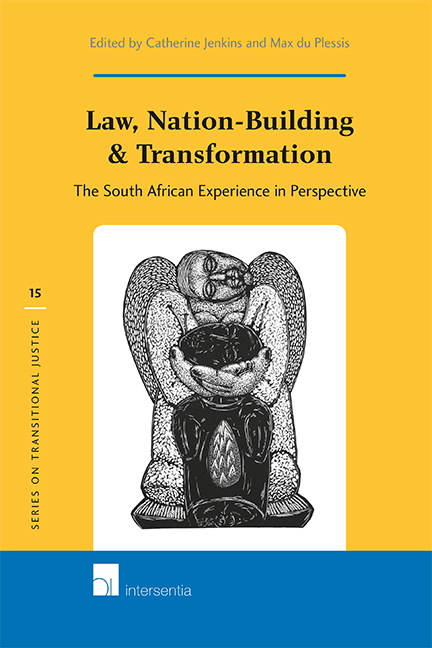Book contents
- Frontmatter
- Editors’ Foreword
- Contents
- Chapter 1 Transitional Justice: Lessons from South Africa?
- Chapter 2 Reflections on Post-Apartheid Nation-Building: Identity, Participation, Community
- Chapter 3 The Truth and Reconciliation Commission Process: A Retrospective
- Chapter 4 Rights at Work: The Transition to Constitutional Democracy and Women in South Africa
- Chapter 5 Crime, Policing and Nation-Building
- Chapter 6 Public Schools for Afrikaners in South Africa
- Chapter 7 Behind the Mask of the Rainbow Nation: The Limits of Law in Post-Apartheid South Africa
- Chapter 8 The Transformation of the Judiciary
- Chapter 9 Assessing the Social Transformation Performance of the South African Constitutional Court: From Totalitarianism to the Rule of Law
- Chapter 10 The Transformation of Land Law
- Chapter 11 The South African Presidency in Comparative African Context
- Chapter 12 Aspects of the Treatment of Freedom of Expression in South Africa’s Democratic Transition
- Chapter 13 Constitutionalism in Commonwealth Africa: Comparative Perspectives
Chapter 5 - Crime, Policing and Nation-Building
Published online by Cambridge University Press: 16 December 2020
- Frontmatter
- Editors’ Foreword
- Contents
- Chapter 1 Transitional Justice: Lessons from South Africa?
- Chapter 2 Reflections on Post-Apartheid Nation-Building: Identity, Participation, Community
- Chapter 3 The Truth and Reconciliation Commission Process: A Retrospective
- Chapter 4 Rights at Work: The Transition to Constitutional Democracy and Women in South Africa
- Chapter 5 Crime, Policing and Nation-Building
- Chapter 6 Public Schools for Afrikaners in South Africa
- Chapter 7 Behind the Mask of the Rainbow Nation: The Limits of Law in Post-Apartheid South Africa
- Chapter 8 The Transformation of the Judiciary
- Chapter 9 Assessing the Social Transformation Performance of the South African Constitutional Court: From Totalitarianism to the Rule of Law
- Chapter 10 The Transformation of Land Law
- Chapter 11 The South African Presidency in Comparative African Context
- Chapter 12 Aspects of the Treatment of Freedom of Expression in South Africa’s Democratic Transition
- Chapter 13 Constitutionalism in Commonwealth Africa: Comparative Perspectives
Summary
‘KILL THE BASTARDS’
In April 2008, some three weeks before the 14th anniversary of what the ANC calls the ‘democratic breakthrough’ of the elections in 1994, Susan Shabangu, the then Deputy Minister of Safety and Security and a woman involved in the struggle against apartheid since the early 1980s, was asked by members of the audience at a community meeting in Pretoria what she and her government were doing to curb crime. From press reports of the event, it is unclear how she structured her response: one cannot tell if she talked about recent declines in unemployment or government's commitment of billions of rands to the construction of housing; one cannot tell if she addressed herself to reducing inequality or helping to build better family structures; one cannot tell if she spoke about addressing drug abuse or redressing historical patterns of patriarchy. What is clear is that, when she turned to the question of the role of the police in keeping communities safe, her views tended to the robust: ‘You must kill the bastards if they threaten you or the community. You must not worry about the regulations. That is my responsibility. Your responsibility is to serve and protect.’
Warming to her theme, she said that she wanted to assure police officers that they had ‘permission to kill these criminals. I won't tolerate any pathetic excuses for you not being able to deal with crime. You have been given guns, now use them.’ She continued:
‘I want no warning shots. You have one shot and it must be a kill shot. If you miss, the criminals will go for the kill. They don't miss. We can't take this chance. Criminals are hell-bent on undermining the law and they must now be dealt with. If criminals dare to threaten the police or the livelihood or lives of innocent men, women and children, they must be killed. End of story. There are to be no negotiations with criminals’.
It was a chilling speech made by someone clearly playing to an audience – she received a standing ovation and, a few days later, nearly 90% of respondents to a newspaper phone-in survey on the subject said Shabangu was right. This might have been less depressing if the response from government and the opinionmaking elite had been suitably horrified.
- Type
- Chapter
- Information
- Law, Nation-Building and TransformationThe South African Experience in Perspective, pp. 123 - 138Publisher: IntersentiaPrint publication year: 2014

